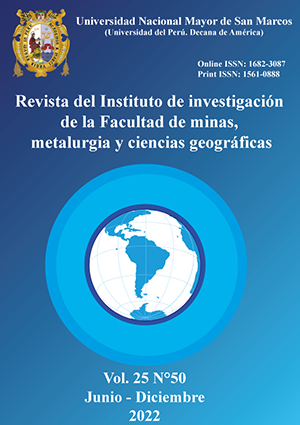Metal Trace Assessment in Marine Water and Sediment of Ensenada Mackellar, Antarctica (2018-2019)
DOI:
https://doi.org/10.15381/iigeo.v25i50.24305Keywords:
Trace Metals, Copper (Cu), Zinc (Zn), Arsenic (As), Leads (Pb)Abstract
There is concern about the anthropogenic impact on the Antarctic ecosystem, for this reason the Peruvian Marine Research Institute carried out the Twenty-Fifth and Sixth scientific expeditions of Peru to Antarctica. The investigations were carried out in the austral summer 2018-2019 aboard the BAP Carrasco from the Mackellar Cove located on King George Island, in which samples of water and marine sediment were taken at 11 sampling stations for the evaluation of trace metals (Cu, Zn, As and Pb) by inductively coupled plasma mass spectrometry (ICP-MS). It was observed that the highest concentration levels of Cu, As and Pb in the water matrix corresponded to the year 2019, compared to the year 2018. Also, these metals did not exceed the Environmental Quality Standards (EQS), for which it is considered that there is no risk of water contamination yet. However, there is a trend of increasing concentration of these metals each year. On the other hand, the concentrations of Cu and As in the sediment exceeded the EQS, so these metals could cause adverse effects on the marine ecosystem.
Downloads
Published
Issue
Section
License
Copyright (c) 2022 Jonathan Delio Alfaro Jaucha, Carlos Alberto Martínez Gamboa, Jorge Tam Málaga, Rita Orozco Moreyra

This work is licensed under a Creative Commons Attribution 4.0 International License.
AUTHORS RETAIN THEIR RIGHTS:
a. Authors retain their trade mark rights and patent, and also on any process or procedure described in the article.
b. Authors retain their right to share, copy, distribute, perform and publicly communicate their article (eg, to place their article in an institutional repository or publish it in a book), with an acknowledgment of its initial publication in the Rev. Inst. investig. Fac. minas metal cienc. geogr.
c. Authors retain theirs right to make a subsequent publication of their work, to use the article or any part thereof (eg a compilation of his papers, lecture notes, thesis, or a book), always indicating the source of publication (the originator of the work, journal, volume, number and date).























